As an Amazon Associate I earn from qualifying purchases.
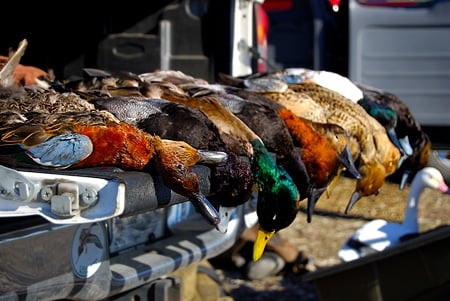
UPDATE: I want to thank everyone who has responded to this post, both below in the comments section and to me directly via email. More than one of your responses has been so moving it’s stopped me in my tracks. And Zane from Cleveland, your letter choked me up pretty bad. It is rare for me to write about such things; doing so feels like opening a vein in public. I am glad to know that I am not alone out there. Thank you.
I have been dealing a lot of death lately. I’ve hunted five of the past eight days, and have killed birds on each trip. My larder is filling, and Holly and I are eating well. Lots of duck, some pheasant and even a little of the venison I have left over from the 2010 season. That is the good side of all this, the side of hunting that most people can embrace. I hunt for a lot of reasons, but for me the endgame is always the table.
It is the journey to that table that can sometimes give people pause. What I do to put meat in my freezer is alien to most, anathema to some. In the past seven years, I can count on one hand the times I’ve had to buy meat for the home. This fact alone makes me an outlier, an anomaly. And that I am unashamed — proud, really — of this seems to cause a lot of folks I meet to look at me funny: I am a killer in their midst.
Not too long ago, I was at a book signing event for Hunt Gather Cook when a young woman approached me. She was very excited about foraging, and she had loved that section of my book. Then her face darkened. She told me she’d also read my section on hunting. “How can you enjoy killing so much? I just don’t understand it. You seem like such a nice person, too.” It took a few minutes for me to explain myself to her, and I am grateful that she listened. She left, I think, with a different opinion.
A few weeks later, I was at the University of Oregon talking about wild food to some students. When I mentioned hunting, I could feel the temperature in the room drop. It occurred to me that no one there was a hunter, nor were they close to any hunters. I called for a show of hands. One guy raised his. I asked him briefly about his hunting experience, and it was obvious that it had been traumatic for the poor kid. I let the topic slide and moved on to mushrooms.
When I was in Cambridge, Massachusetts, I spoke with more than 100 diners during my book dinner at the excellent restaurant Craigie on Main. Only four were hunters, although a few more wanted to start. Over the course of the night, I fielded weird question after weird question from diner after diner. Have I ever shot someone? Did I actually eat what I shot? Wasn’t I afraid of diseases? It was a stark show of ignorance. Not stupidity, mind you, just an utter lack of knowledge of what hunting is all about.
To be sure, these encounters were in college towns among a certain set of people. I had some book events, notably those in Montana, Pittsburgh and Austin, where most everyone who attended either hunted or was at least familiar with it. And in most places I could be assured of a healthy smattering of fellow hook-and-bullet types or farmers, who are equally familiar with the death of animals.
But the fact remains: Most people reading this have never killed anything larger than an insect, and among those who have it’s usually a been fish, or an accident — like running over someone’s dog. Most people have no idea what it’s like to take the life of another creature, let alone why someone would actively seek to do so. Let me try to explain to you the way I did to my young foraging friend on book tour. Let me tell you what it means to kill, at least for me.
To deal death is to experience your world exploding. It is an avalanche of emotion and thought and action.
Armed with a shotgun, it is often done without thought, on instinct alone. A flushing grouse gives you no more than a few seconds to pull the trigger before it disappears into the alders. A rabbit can leap back into the brambles in even less time. Unless you are perfect in that split second, the animal wins. And being human, we are far from perfect. Even with ducks, where you often have plenty of time to prepare for the shot, their speed and agility are more than adequate defenses. We hunters fail more than we succeed.
This is why we will often whoop it up when we finally bring a bird down: We are not being callous, rejoicing in the animal’s death. It is a hard-wired reaction to succeeding at something you have been working for days, months, even years to achieve. In some corner of your brain, it means you will eat today. This reaction can look repulsive from the outside.
Should you arm yourself with a rifle, you then must wrestle your conscious mind. Buck fever is real. A huge set of antlers will hypnotize the best of us, man and woman alike. Even if the animal lacks antlers, as mine often do, you have to contend with The Twin Voices: On one shoulder sits a voice shouting, Shoot! Shoot! You might not get another chance! On the other shoulder sits another voice, grave and calm: Be careful. You must not put that bullet in a place where the animal will suffer. Better to pass a shot than wound an animal. A wise hunter does not kill lightly.
In that moment when the game shows itself and you ready yourself to shoot, all that matters is that you do your job correctly. And that job is to kill cleanly and quickly. The animal deserves it; we would want no less were the tables turned. And make no mistake: A great many hunters, myself included, do this mental table-turning with some frequency. Seeing animals die so often makes us think of our own death, and I can assure you most of us would rather die with a well-placed shot than wither in a hospital.
We also know all too well that we are fallible creatures. When we fail to kill cleanly, when we wound the animals we seek, it is our duty to end their suffering ourselves. If there is a moment in this whole process that breaks my heart, it is this one. Everything wants to live, and will try anything it can to escape you. We see ourselves in this struggle, feel tremendous empathy for the struggling bird, the fleeing deer. It is a soul-searing moment where part of you marvels at the animal’s drive to live — to escape! — at the same time the rest of you is consumed with capturing it as fast as possible so you can end this miserable business. This internal conflict is, to me, what being human is all about. A coyote or a hawk has no remorse. We do.
I am not ashamed to tell you that I have shed a tear more than once when I’ve had to deliver the coup de grace to a duck. I’m not sure what it is about ducks, but they affect me more than other animals. I always apologize to it, knowing full well that this is a weak gesture designed mostly to help me feel better. But it does help me feel better. At least a little. So I keep doing it.
As the moment of killing fades, death rides home with you in the back of the truck. Once home, you must transmogrify the animal you killed into meat. The transformation is a mystical one, and every time I “dress” game — such a pleasant euphemism, that — I marvel at how fast my mind toggles from hunter to butcher to cook.
It is a necessary process, and one that is vital to why I have chosen this life, why I am a hunter.
I look down at my keyboard and see death under my fingernails. I smell the fat and gore and meat of dead ducks upon me; it’s been a good week of hunting. And because I eat everything on a duck but the quack, I have become intimate with the insides of waterfowl. Over the years, I’ve gutted and taken apart so many animals that I know the roadmap blindfolded. And that road leads to meals long remembered. I reach into a deer’s guts without thought: I want those kidneys, and that liver. I turn my arm upwards and wrap my fingers around its stopped heart, slick and firm. It will become heart cutlets, or jaeger schnitzel.
Once plucked and gutted, I can take apart a duck in 90 seconds. Maybe less. My fingers intuitively know which way and how hard to pluck each feather from a pheasant’s carcass. I know just where to put my boning knife, sharp as lightning, to slice the tendons that hold a hog’s tongue into its head. I use the same knife to caress its hind legs, separating the natural muscle groups apart along each seam. Some will become roasts, others salami. Animal becomes food. The pop of a goose’s thigh bone disjointing from its body no longer sickens me; all it means is that I need to slip my knife under that bone and around the coveted “oyster,” the best bite on any bird.
Wasting meat is the sin I cannot forgive. When I kill an animal, its death is on my hands, and those animals to whom I’ve had to deliver the coup de grace are especially close to me. There is a bond between us that requires that I do my part to ensure they did not die for nothing. This is why I spend so much time creating recipes for every part of the animal. Nature wastes nothing, and neither should I. It pains me to know that some hunters do not share this feeling, that they care only for backstraps or breasts — and while I know that coyotes and buzzards will eat what we do not, I do not hunt to feed those creatures.
You might ask me that with all this, why bother eating meat at all? Why deal with all the moral and emotional implications? In the face of such constant death, is it not better to be a vegetarian?
For me, no. It is a cold fact that no matter what your dietary choice, animals die so you can eat. Just because you choose not to eat the flesh of animals does not mean that their homes did not fall to the plow to become acres of vegetables and soybeans, wheat and corn. Habitat, more than anything, determines the health of a species. The passenger pigeon may have been snuffed out by wanton, unregulated hunting, but it was the massive destruction of virgin forest — forest cleared to grow crops — that brought the pigeon to the brink. I have nothing against vegetarians, and the vast majority I’ve met understand what I do and respect it. But to those few who do not, I say this: We all have blood on our hands, only I can see mine.
It all boils down to intimacy. Hunting has created an uncommon closeness between the animals I pursue, the meat I eat, and my own sense of self. There is a terrible seriousness to it all the underlies the thrill of the chase, the camaraderie of being with my fellow hunters and deep sense of calm I feel when alone in the wild. I welcome this weight: It fuels my desire to make something magical with the mortal remains of the game I manage to bring home. It is a feeling every hunter who’s ever stared into the freezer at that special strip of backstrap, or hard-won bird or beast understands.
Meat should be special. It has been for most of human existence. And no modern human understands this more than a hunter. I am at peace with killing my own meat because for me, every duck breast, every hog tongue, every deer heart is a story, not of conquest, but of communion.
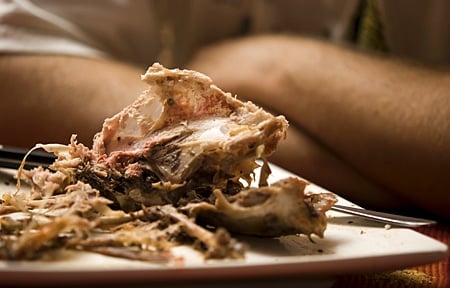
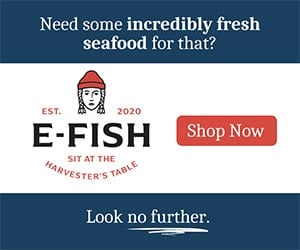
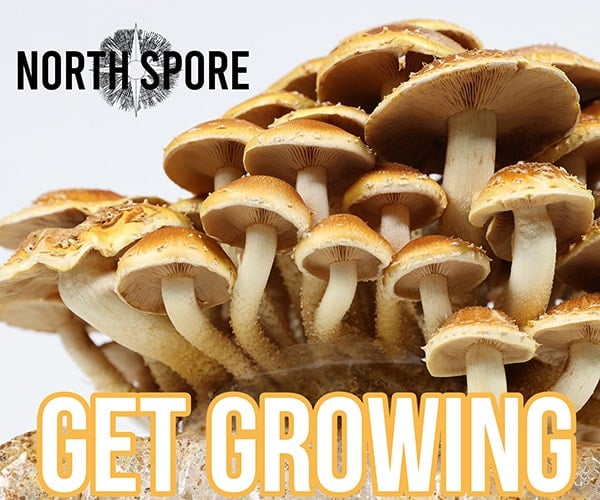
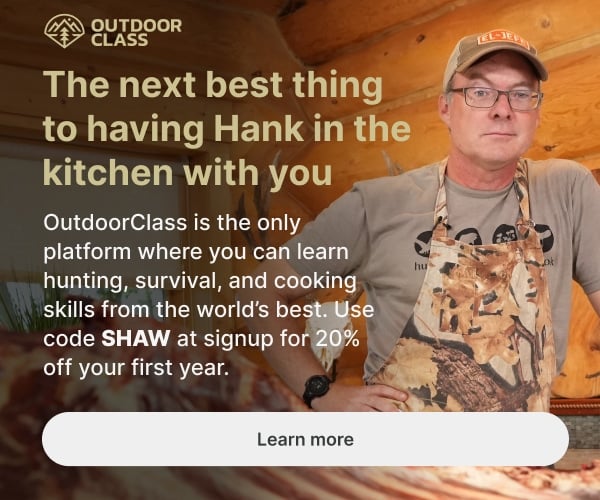
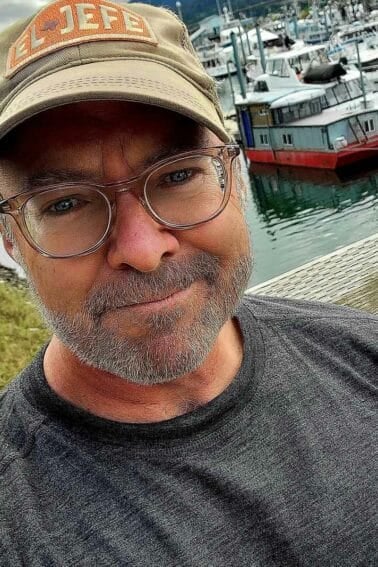
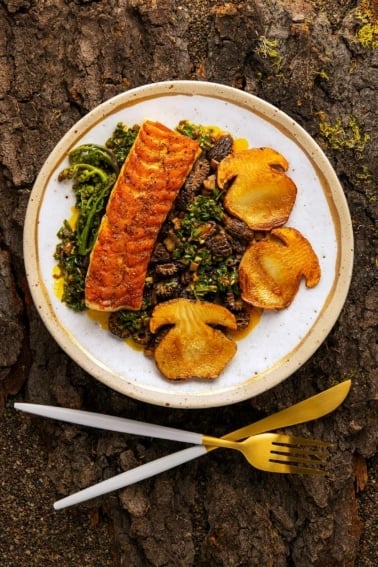
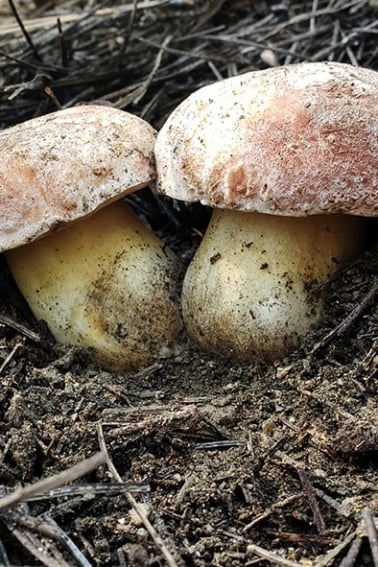
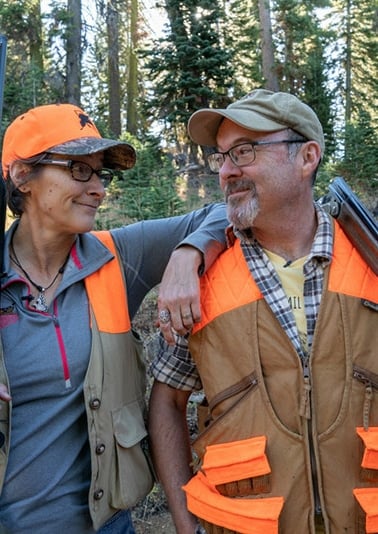
Hank
I wanted to let you know how much I enjoyed your blog “On Killing.” Very well said! I will be up at SAC ISE, I hope I get the chance to meet you there. If you get a chance swing by my WildEats booth. I think you’ll find we have a lot in common.
Respectfully yours
John McGannon
I hunt because it is a human thing to do. If I lived 10,000 years ago, I’d be the guy painting pictures of stag elk on the cave wall because I love not just the meat crackling on the fire (and Hank would be there too, whipping up some crazy-ass delicious sauce for the stag), but I love the animal. Love. The. Animal. I love the wildness it represents and the beauty of its environment and when I’m in that wildness and with that animal, I feel more human and more alive than when I’m anywhere else. All tribes have their hunters, those skilled individuals who are hardwired to shoot the arrow, slit the throat and shoulder the bloody kill for the long hike home. Hell, isn’t that how our species survived the freaking Ice Age? I killed my first bird when I was 11 (a valley quail with a pellet through the eye) and I knew then I was that person in my tribe. Hank would be pissed because I breasted it out and charred it like a piece of black toast on my dad’s barbecue, but I’ve never looked back. (But my cooking skills have improved.)
Thanks, Hank, for adding another masterpiece to the cave wall.
Hear hear, Hank!
Great blog, this is the first time I’ve stopped by to read. You sure do think about things a lot I have to say. Good that you use the fifth quarter, too many leave the best bits. I think you have to be into cooking or exposed to eating game to see the opportunity in a shank, or the rarity of fresh embryonic sack.
I just completed Jackson Lander’s course on Hunting Deer for Food in VA over Thanksgiving, partly inspired by you Hank. I appreciate it that you take it all the way, and the time to really pin down what are difficult feelings to capture in print. I will share this essay with my fellow classmates.
Not to be repetitive, but this is very well said.
I’ve been a hunter since I was 12 when I shot my first rabbit. Since then I’ve killed more deer and elk than I can remember. The emotions I now experience when I have success during a hunt may have dimmed a bit since the first time I pointed a loaded rifle at a live creature knowing that when I pulled the trigger it was going to die. But I still say a silent prayer to myself in appreciation of the life I’ve just taken and in thanks for the meat that I’m receiving.
I have two daughters who began accompanying me on hunting trips when they were six years old. When they were old enough to skillfully use a knife they would help butcher the animals for the freezer. They are now teenagers and have each successfully taken several deer and elk themselves. They don’t revel in or enjoy the kill, but they are proud that they can help put meat on the table.
When we package our meat, we identify the animal taken on the package by date and sex. When we sit down to a meal of elk or venison we reminisce about the hunt when this animal was taken. And although my wife doesn’t participate in the hunt, we all appreciate the connection to the animal we are enjoying.
Although we live in a small town in western Colorado where hunting is not rare, it is amazing to still hear the comments from the anti-hunter crowd. “Why do you hunt – you can get perfectly good meat in the grocery store.” “I can’t believe that you take your daughters hunting.” And “I can’t believe they don’t have a problem with killing things!” I have always either just shrugged them off or if I thought they might be somewhat receptive to a different perspective, I’ve tried to explain ours. From now on I’ll just forward them a link to this post.
Thanks,
Mike
I too love to hunt and to eat all I kill. I don’t like to kill but get by it by eating the animals birds with respect. I recently lost a big game animal and it is really tearing me up. To kill without recovering the animal can be agonizing if you are fond of animals.
Great post Hank
regards
Dan
I applaud your attitude and philosophy on hunting and not wasting any part of the animal you kill. It is an attitude that is lost on people who get their meat at the grocery store in tidy little packages. My mom grew up on a farm and they also used every part of the animal they butcher because that is the right thing to do when an animal gives up its life so you may live off its meat. If only more of us apply that same philosophy irregardless or whether or not we hunt. It is important to remember where your food comes from and to appreciate it and not waste it. Thanks for the post, I really enjoyed reading it.
Well done. Could not have said it better myself. Thank you.
Well said. Especially the part on the “whooping it up.” I’ve never hunted, but desperately want to. I’ve seen the hunting shows where it’s as if the hunter has scored a touchdown. Now, at least, it makes some sense.
Nicely put. As Hunters we have many responsibilities, not the least of which is to kill our quarry as quickly and as humanly as possible. Doing so requires practice at the range, experience and most of all sound judgment. We must each know the limits of our equipment and personal capabilities. Taking a questionable shot is unethical and bad for the pursuit we all love.
I am a vegetarian (my whole life) and will never eat meat because I don’t like it. I admit that I also have a hard time thinking about animals being slaughtered but I have always known that a vegetarian is not cost free to animals or to the environment. I love reading your essays on hunting because it keeps my feelings about it in perspective. I think trophy hunting or hunters who use very little of the meat they kill is horrible. It really upsets me. But the way you hunt is how humans have been hunting for thousands of years with respect, with need, using as much of the animal as possible, and being cognizant of the relationship (sometimes heavy) between your kills and yourself. Vegetarians who think they don’t negatively impact or indirectly kill animals are definitely kidding themselves and hunters who waste animals and don’t respect the weight of taking the lives of animals are people I can’t admire. I wish both those camps would listen to you, read your essays.
But the worst, I think, are people who eat meat from the store without a qualm but are horrified at anyone who could look an animal in the face and KiLL it. I have a friend who learned to kill her own rabbits and she got such shit from other people over that – people who eat the meat others have killed with no horror, but somehow they think that a willingness to kill your own meat makes you strange? People having such a disconnection between their consciences and their hands dumbfounds me.
I know you will probably think nothing compares to the experience of killing your own food, but though I will never have that experience I do feel that intimacy with my food that you describe by growing a lot of my own food and foraging in the wild for some. I do feel the life in all things and I know that makes me sound like way more of a hippie than I am, but for food to nourish it must have life in it. I love looking for and picking wild elderberries in the woods and going on nettle picking trips. I believe our experience of food is not so different from each other which is why I can relate to your writing which is so meat-centric.
I have the deepest respect for your hunting and your relationship with your food and I can only wish that more and more people will reconnect with theirs in a similar way no matter whether their diet is plant based, meat based, or both. I loved this post.
It’s good to know that others actually think about the kill and look on in sympathy at something grasping for life when the kill isn’t so clean. Also enjoyed the part about why we celebrate, I feel that covers most of us out there but there are a few of the Foiles out there that give the rest of us a bad rap with their demented acts toward their kills.
I had never thought about that fact that more crops for vegans means less habitat and certain death for animals. Great write up Hank, thanks!
Beautifully said. I appreciated @LeahAdams’ reply, as well – and glad the vegans on your chicken-event came away with fresh perspective.
I have been witness to my friend killing his domesticated quail. I have held them as he cuts their heads off with scissors (quickly) and then gutted them under his tutelage. You are right – it goes fast with a little practice.
The cooing noises they made as he held them to calm them down before their death was very striking to me. I recently watched a video on a woman who farmed turkeys and killed them with her clients participating, and how she lovingly calmed them down as well.
I really would like to learn to hunt. For the time being, I buy all my meat at the farmer’s market, where I can talk to the actual farmer and come away paying dearly for it, but knowing that the animals lived how they were supposed to – i.e. chickens eating insects, cows eating grass, and having a great life till the humane end.
Great post, Hank.
I’m going over my final copyedits right now and this feels like a nicely distilled echo of so much of what I’ve been steeped in here in my own writing.
Hank, I grew up hunting in northern Michigan, It is religion here. I seldom venture into the woods during our roughly six months of hunting seasons without a gun or bow in my hands. By the end of hunting season I start to feel like the grim reaper among the wild. I love hunting, but I do not enjoy killing. Killing wild game for food makes you realize that we are not removed from the fabric of life.
“It is here that we seek—and still find—our meat from God”.
Aldo Leopold
Great article Hank I really enjoyed reading it!
Nicely turned essay, Hank. And from the comments, I’d say it hits home.
Hank, sir, you nailed it. I can’t add anything else. Thank you, very much.
The hunters in my family feel as you do. They don’t shoot lightly or for souvenirs. They hunt for meat, which they distribute through our family. I’ve been lucky to have had access to healthy game meat all of my life, along with the organic meat my parents raised on the hobby farm they bought when I was a young adult. My nieces and nephews have benefited most – they’ve been raised on organic meat and vegetables from my parents’ farm, supplemented with game. They’re now learning hunting and tracking skills from my father and brother.